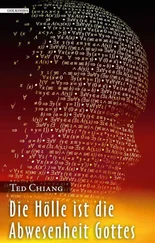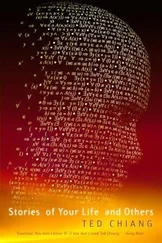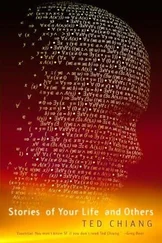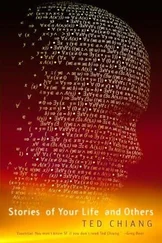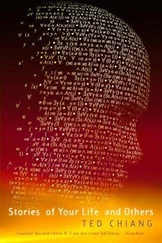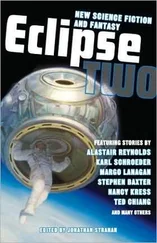By shifting his head back and forth, he saw slight differences in the way the gaslight was refracted, indicating the boundaries of the megafoetus’s internal organs. ‘Is this creature… alive?’
‘Only in an insensate manner, like a spermatozoon. No artificial process can replace gestation; it is the vital principle within the ovum which quickens the foetus, and the maternal influence which transforms it into a person. All we’ve done is effect a maturation in size and scale.’ Fieldhurst gestured toward the megafoetus. ‘The maternal influence also provides a foetus with pigmentation and all distinguishing physical characteristics. Our megafoetuses have no features beyond their sex. Every male bears the generic appearance you see here, and all the females are likewise identical. Within each sex, it is impossible to distinguish one from another by physical examination, no matter how dissimilar the original fathers might have been; only rigorous record keeping allows us to identify each megafoetus.’
Stratton stood up again. ‘So what was the intention of the experiment if not to develop an artificial womb?’
‘To test the notion of the fixity of species.’ Realizing that Stratton was not a zoologist, the earl explained further. ‘Were lens grinders able to construct microscopes of unlimited magnifying power, biologists could examine the future generations nested in the spermatozoa of any species and see whether their appearance remains fixed, or changes to give rise to a new species. In the latter case, they could also determine if the transition occurs gradually or abruptly.
‘However, chromatic aberration imposes an upper limit on the magnifying power of any optical instrument. Messieurs Dubuisson and Gille hit upon the idea of artificially increasing the size of the foetuses themselves. Once a foetus reaches its adult size, one can extract a spermatozoon from it and enlarge a foetus from the next generation in the same manner.’ Fieldhurst stepped over to the next table in the row and indicated the tank it supported. ‘Repetition of the process lets us examine the unborn generations of any given species.’
Stratton looked around the room. The rows of tanks took on a new significance. ‘So they compressed the intervals between “births” to gain a preliminary view of our genealogical future.’
‘Precisely.’
‘Audacious! And what were the results?’
‘They tested many animal species, but never observed any changes in form. However, they obtained a peculiar result when working with the seminal foetuses of humans. After no more than five generations, the male foetuses held no more spermatozoa, and the females held no more ova. The line terminated in a sterile generation.’
‘I imagine that wasn’t entirely unexpected,’ Stratton said, glancing at the jellied form. ‘Each repetition must further attenuate some essence in the organisms. It’s only logical that at some point the offspring would be so feeble that the process would fail.’
‘That was Dubuisson and Gille’s initial assumption as well,’ agreed Fieldhurst, ‘so they sought to improve their technique. However, they could find no difference between megafoetuses of succeeding generations in terms of size or vitality. Nor was there any decline in the number of spermatozoa or ova; the penultimate generation was fully as fertile as the first. The transition to sterility was an abrupt one.
‘They found another anomaly as well: while some spermatozoa yielded only four or fewer generations, variation occurred only across samples, never within a single sample. They evaluated samples from father and son donors, and in such instances, the father’s spermatozoa produced exactly one more generation than the son’s. And from what I understand, some of the donors were aged individuals indeed. While their samples held very few spermatozoa, they nonetheless held one more generation than those from sons in the prime of their lives. The progenitive power of the sperm bore no correlation with the health or vigor of the donor; instead, it correlated with the generation to which the donor belonged.’
Fieldhurst paused and looked at Stratton gravely. ‘It was at this point that the Académie contacted me to see if the Royal Society could duplicate their findings. Together we have obtained the same result using samples collected from peoples as varied as the Lapps and the Hottentots. We are in agreement as to the implication of these findings: that the human species has the potential to exist for only a fixed number of generations, and we are within five generations of the final one.’
Stratton turned to Ashbourne, half expecting him to confess that it was all an elaborate hoax, but the elder nomenclator looked entirely solemn. Stratton looked at the megafoetus again and frowned, absorbing what he had heard. ‘If your interpretation is correct, other species must be subject to a similar limitation. Yet from what I know, the extinction of a species has never been observed.’
Fieldhurst nodded. ‘That is true. However, we do have the evidence of the fossil record, which suggests that species remain unchanged for a period of time, and then are abruptly replaced by new forms. The Catastrophists hold that violent upheavals caused species to become extinct. Based on what we’ve discovered regarding preformation, it now appears that extinctions are merely the result of a species reaching the end of its lifetime. They are natural rather than accidental deaths, in a manner of speaking.’ He gestured to the doorway from which they had entered. ‘Shall we return upstairs?’
Following the two other men, Stratton asked, ‘And what of the origination of new species? If they’re not born from existing species, do they arise spontaneously?’
‘That is as yet uncertain. Normally only the simplest animals arise by spontaneous generation: maggots and other vermiform creatures, typically under the influence of heat. The events postulated by Catastrophists – floods, volcanic eruptions, cometary impacts – would entail the release of great energies. Perhaps such energies affect matter so profoundly as to cause the spontaneous generation of an entire race of organisms, nested within a few progenitors. If so, cataclysms are not responsible for mass extinctions, but rather generate new species in their wake.’
Back in the laboratory, the two elder men seated themselves in the chairs present. Too agitated to follow suit, Stratton remained standing. ‘If any animal species were created by the same cataclysm as the human species, they should likewise be nearing the end of their life spans. Have you found another species that evinces a final generation?’
Fieldhurst shook his head. ‘Not as yet. We believe that other species have different dates of extinction, correlated with the biological complexity of the animal; humans are presumably the most complex organism, and perhaps fewer generations of such complex organisms can be nested inside a spermatozoon.’
‘By the same token,’ countered Stratton, ‘perhaps the complexity of the human organism makes it unsuitable for the process of artificially accelerated growth. Perhaps it is the process whose limits have been discovered, not the species.’
‘An astute observation, Mr. Stratton. Experiments are continuing with species that more closely resemble humans, such as chimpanzees and ourang-outangs. However, the unequivocal answer to this question may require years, and if our current interpretation is correct, we can ill afford the time spent waiting for confirmation. We must ready a course of action immediately.’
‘But five generations could be over a century – ’ He caught himself, embarrassed at having overlooked the obvious: not all persons became parents at the same age.
Читать дальше


